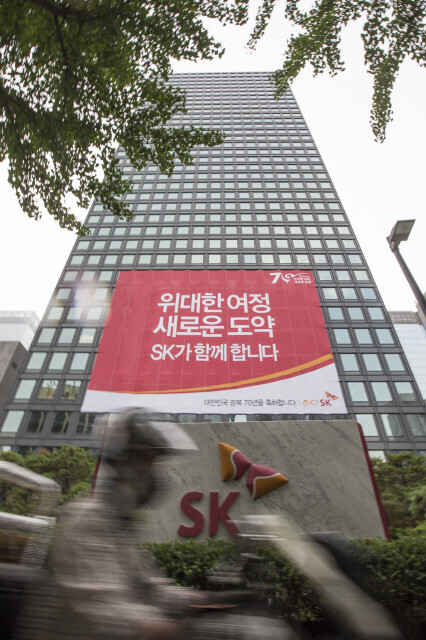hankyoreh
Links to other country sites 다른 나라 사이트 링크
Going back on another election pledge, Pres. Park pardons corporate heavyweights

President Park Geun-hye granted special Liberation Day pardons to 6,527 people on Aug. 13.
The list of recipients included fourteen business figures, including SK Group chairman Chey Tae-won, as well as many small business owners and people convicted of financial crimes. Another 3,650 model prisoners and people on probation for poverty-related crimes received temporary probation suspensions, while 2,206,924 people with administrative sanctions such as driver’s license suspensions or revocations received special leniency.
The pardoning of Chey now has Park facing another controversy over broken election pledges after her promises during the 2012 presidential election campaign that she would “strictly limit the exercise of pardoning authority for serious crimes by controlling shareholders and managers at large corporations.”
Park announced the pardons during a special Cabinet meeting at the Blue House on the morning of Aug. 13.
“In the past, I’ve limited the use of pardons to cases that the public can support, but for the 70th anniversary of Liberation I have decided to offer special pardons aimed at promoting cohesion, stimulating the economy, and boosting the nation’s morale,” she explained.
On the controversial corporate pardons, she said that “some figures from the construction and software industries and some entrepreneurs were included as pardon recipients to help the economy and create jobs.”
At fourteen, the number of major business world figures pardoned -- a focus of major attention in the leadup to the traditional Liberation Day presidential pardons -- was not large. In addition to Chey, the list included Hanwha Group vice chairman Kim Hyun-joong and Yeochun NCC CEO Hong Dong-ok. Figures mentioned as possible recipients, but ultimately passed over, included Hanwha Group chairman Kim Seung-youn, SK Group senior vice chairman Chey Jae-won, and LIG Group chairman Koo Ja-won.
The pardoning decisions were “made in consideration of whether they accorded with public feelings and [the individuals] would contribute helping the economy,” the Blue House said. Politicians were not included among the grantees because of popular sentiment against doing so, sources reported.
Critics said the pardons from Park, who remained firmly against “indiscriminate” pardons during her presidential run in 2012, is yet another example of deserting previous principles. Running on a pledge of “limiting pardoning authority” for corporate figures, she continued to promise a stern response after taking office.
“Many times people who have committed crimes have avoided the law or received light punishments simply because they have money or power,” she said at the time.
At the time of a scandal involving a list of people implicated in bribes by Keangnam Enterprises chairman Sung Wan-jong in April, Park noted that Sung had twice received special pardons under the Roh Moo-hyun administration (2003-08).
“Special pardons for businesspeople should only happen when there is an acceptable level of consensus in the public,” Park said.
The Korean Bar Association released a commentary on Aug. 13 expressing “concerns about regressions in constitutionalism from the inclusion of chaebol chairmen and other corporate figures [in the pardons] even when parole and other relief procedures exist as stipulated in the criminal code.”
“The granting of such a large number of special pardons could be in violation of the law,” the statement argued.
Lee Eun-mi, a team leader at the administration watch center for the group People’s Solidarity for Participatory Democracy, said the “pardoning of corrupt businesspeople runs counter to the ideas of popular unity and economic justice.”
“There is no evidence that pardons of chaebol chairmen have been linked to job creation and helping the economy,” Lee noted.
The group Citizens’ Coalition for Economic Justice singled out special leniency measures for 2,200 construction companies as a target for criticism.
“Abuses of pardoning authority by past presidents have sent the strong message that responsibility for illegal actions by large construction businesses will ultimately be waived,” it said.
By Choi Hye-jung, Lee Se-young and Kim Kyu-nam, staff reporters
Please direct questions or comments to [english@hani.co.kr]

Editorial・opinion
![[Column] Has Korea, too, crossed the Rubicon on China? [Column] Has Korea, too, crossed the Rubicon on China?](https://flexible.img.hani.co.kr/flexible/normal/500/300/imgdb/original/2024/0419/9317135153409185.jpg) [Column] Has Korea, too, crossed the Rubicon on China?
[Column] Has Korea, too, crossed the Rubicon on China?![[Correspondent’s column] In Japan’s alliance with US, echoes of its past alliances with UK [Correspondent’s column] In Japan’s alliance with US, echoes of its past alliances with UK](https://flexible.img.hani.co.kr/flexible/normal/500/300/imgdb/original/2024/0419/2317135166563519.jpg) [Correspondent’s column] In Japan’s alliance with US, echoes of its past alliances with UK
[Correspondent’s column] In Japan’s alliance with US, echoes of its past alliances with UK- [Editorial] Does Yoon think the Korean public is wrong?
- [Editorial] As it bolsters its alliance with US, Japan must be accountable for past
- [Guest essay] Amending the Constitution is Yoon’s key to leaving office in public’s good graces
- [Editorial] 10 years on, lessons of Sewol tragedy must never be forgotten
- [Column] A death blow to Korea’s prosecutor politics
- [Correspondent’s column] The US and the end of Japanese pacifism
- [Guest essay] How Korea turned its trainee doctors into monsters
- [Guest essay] As someone who helped forge Seoul-Moscow ties, their status today troubles me
Most viewed articles
- 1[Column] The clock is ticking for Korea’s first lady
- 2After 2 months of delayed, denied medical care, Koreans worry worst may be yet to come
- 3Samsung barricades office as unionized workers strike for better conditions
- 4[Column] Has Korea, too, crossed the Rubicon on China?
- 5[Correspondent’s column] In Japan’s alliance with US, echoes of its past alliances with UK
- 6Hong Se-hwa, voice for tolerance whose memoir of exile touched a chord, dies at 76
- 7All eyes on Xiaomi after it pulls off EV that Apple couldn’t
- 8US overtakes China as Korea’s top export market, prompting trade sanction jitters
- 9[Editorial] When the choice is kids or career, Korea will never overcome birth rate woes
- 10[Photo] Smile ambassador, you’re on camera